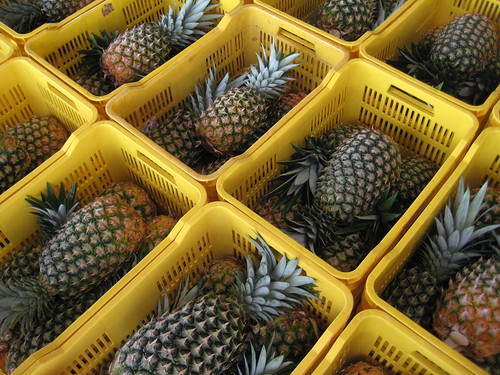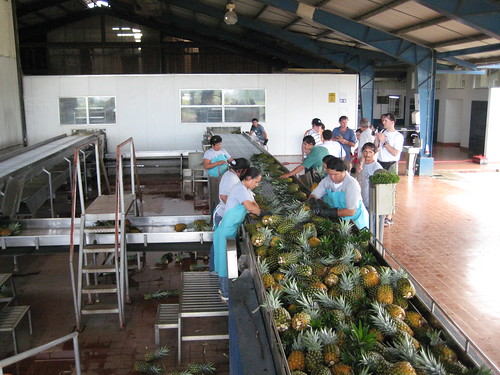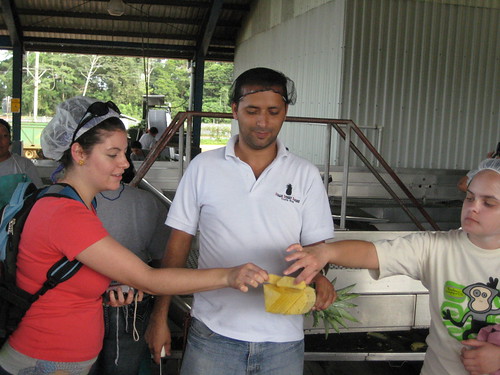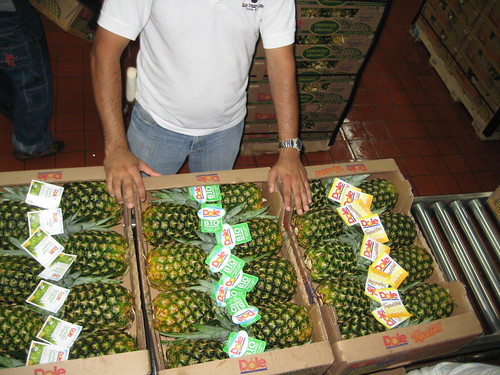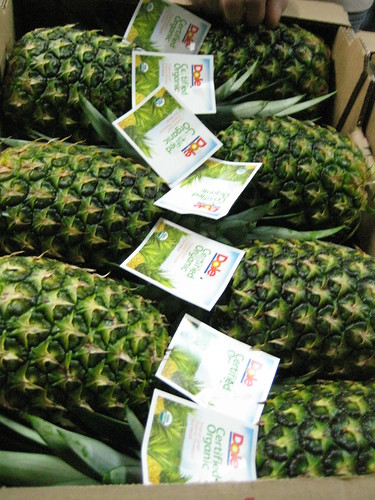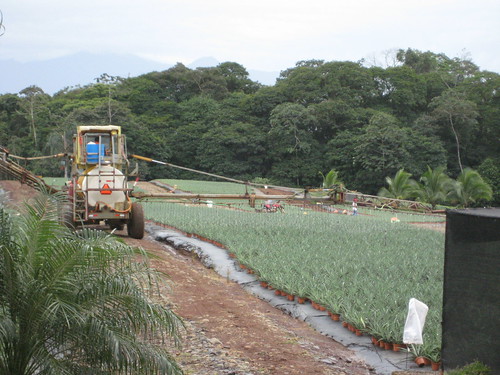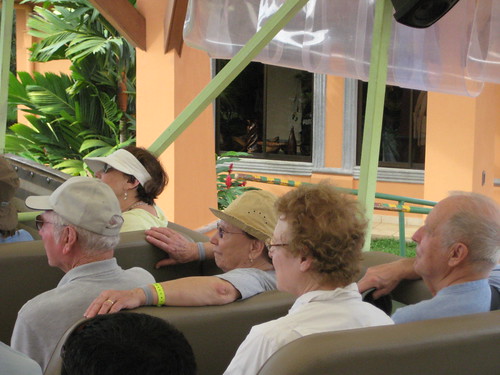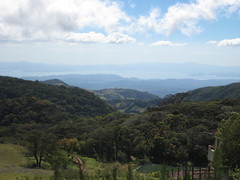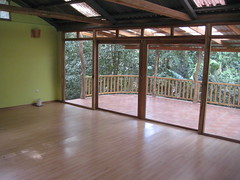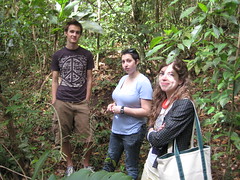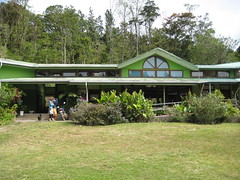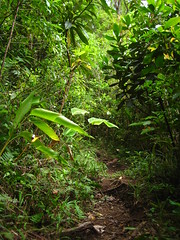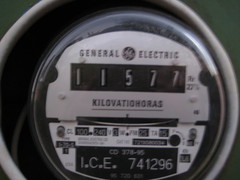During our first week in Costa Rica, we took a field trip to a giant pineapple plantation operated by Dole, a subsidiary of the Standard Fruit Company, both US entities. I mean, this place was huge. 2,800 acres of monoculture with an elegant hacienda sitting in the middle where tourists, mostly white retirees from Florida, if my experience was a typical one, started and finished their $13 a head pineapple plantation tours.
Our group was taken on a tour by a Tico (Costa Rican) by the supposed name of “Danny 'Dole' Rockefeller,” who spoke impressive English, always wore a grin on his face, and talked jovially with us and the workers we passed on the tour, most of whom he knew by name. All the while, I felt some deep, unpleasant feeling in the pit of my stomach. Something was not right; I felt a little used, I felt a little talked down to, but at first I couldn't figure it out. And then I did: the Pineapple Man was flirting with me.Now, this might have been more noteworthy, in a certain way, had be been flirting with just me. It would have been a little blatant, a little obvious especially in a place like Costa Rica, where homosexuality isn't particularly acceptable. No, this guy was a pro; he was flirting with everyone.
Seduction, step 1.
The first stop on our tour was the quality control station: pineapples, having been washed in a chlorine bath, move up a conveyor belt to three women who allow some to pass into the adjacent building, while removing the pineapples of lesser quality and dropping them onto another belt, which scooted them away. This was Danny Dole's specialty, his favorite station; he was on his game. After pleasantly greeting the women, he picked up one of the best looking pineapples from the belt, whipped his oversized machete out of it's holster, and did one of the most impressive things I have ever seen anyone do with a knife: table-less, with the pineapple in one hand and the machete in the other, he effortlessly sliced of the skin of the pineapple, chopped the sweetest part of the pineapple (the outside edges closer to the base) into bite-sized bits, and then used the tip of the knife to misalign each slice so they hung off each edge of the pineapple, easy to grab. And then he held the cut fruit out in front of him, waiting for us to taste his fruit. And we did. And then he did it again. And we ate again. And then he did it again, all the while with a sly, mischievous grin on his face.
After tasting what is probably the best pineapple I have ever tasted in my life, we followed the perfect pineapples into the building, where they were being sorted into three sized and boxed. Danny explained to us that the total weight of each box had to be almost exactly the same, but that the workers were so good at their jobs that they could simply feel the weight of the pineapples and sort them into appropriate boxes as they went, resulting in an endless stream of boxes of nearly identical pineapples. I swear, it was just like Penn and Teller and their damn deck of cards in Vegas.Seduction, step 2.
Next, and this has to be one of the most fascinating machinations of the whole operation, we witness workers stapling labels of three varieties to each pineapple. White labels to be sold in the organic food section in American stores, Green labels to be sold as organic in Europe, and yellow, “Tropical Gold” labels that didn't say “organic” on them anywhere. These pineapples, Danny told us, were sold in the US as non-organic pineapples, because the organic market “wasn't big enough.” “Isn't it great?” He asked us. We're getting people to eat healthier and they don't even know it! But it's all smoke and mirrors: as always, he gives us a little bit of the truth to distract us from what's really going on:
First of all, “organic” by no means means good for you or good for the environment. These pineapples were sprayed with unnatural amounts of a “natural” chemical called Etholine at a young age to cause accelerated growth, then fertilized with imported fish and bone meal. Sorry, vegetarians.
Second, labeling organic pineapples as non-organic is in no way a good thing. What it really means is that some economist on the Dole payrole did some pithy calculations and decided that if Dole supplied only Y amount of pineapples to the national market instead of X, they could artificially keep the price of organic prices higher to reap additional proceeds. On the consumer side, this has the immediate economic effect of restricting organic produce to the wealthy few, and the significantly more potent cultural effect of further defining organic produce as a delicacy of the bourgeois, even though each time everyone else buys a regular pineapple, there's a chance they're actually eating organic after all.
After the labeling, Danny took us to a massive, walk-in freezer that had two pallets of pineapples in the back, near a giant turbine that looked like the one that almost sliced Charlie into a thousand pieces when he started floating uncontrollably in the Gene Wilder version of “Willie Wonka and the Chocolate Factory.” In a gentlemanly fashion, he held the door open for all of us. After the last of us tricked in, he shut the door from the outside, locked it, and turned off the lights.
Now, how many of you can say that Danny 'Dole' Rockefeller locked you in a cooler? That's right. I feel pretty special. After a few seconds, he opened the door back up, cackled, and cracked yet another forgettable American joke. Seduction, step two complete.
Seduction, Step 3.
Then, it was time for the siesta. Back in the front of the hacienda, as we waited for what Danny Dole quaintly called a “limo,” even though it was actually a large tractor pulling a 40-seat covered trailer on 4 ft diameter wheels, we were served more slices of perfect pineapple, some mysterious pineapple-based fruitcake, and piña coladas in hollowed-out pineapple shells. When the Pineapple man witnessed me taking notes on the ridiculousness of it all, he jokingly threatened to confiscate my notebook. If only.
It only goes on from there, so I won't bore you any more than I already have with stories of how special the pineapple man made me feel that day. But I will mention a couple more things we learned as we did our best to ask challenging and critical questions, even as we sat stoned on the lucid high of the massive amounts of pineapple sugar we had already consumed.
Workers who work in the fields are paid by the pineapple, and the “best workers” are capable of planting 10,000 pineapple plants every day by themselves. This equates to between $100 and $140 a week for 9.5 hour days – we never learned how many days a week they work.
Of the 2,800 acres of land that made up this plantation, Danny Dole swore to us that 900 of them were left forested, “to protect the rain forest.” Almost every stand of trees we saw, however, couldn't have been more than 30 ft deep at it's widest point, completely negating any serious biodiversity protection or carbon sequestration genuine forest conservation provides. To their credit, we did witness a real, life howler monkey in one of the trees. The poor thing was probably wondering if it was ever going to see a real forest, or a mate, ever again.
Both the route our bus took to and from the hacienda and the “limo” route through the plantation brought us by a pristine soccer field. When asked who use it, Danny answered an entirely different question, saying that he was the captain of his team because he was so good and so handsome. I'm not sure who wants to play soccer surrounded by pineapples after planting 10,000 plants in 9.5 hours – I know I wouldn't. Conveniently, we had just read an article about the Costa Rican Solidarista movement of the mid-20th century, in which workers were convinced to deunionize in exchange for perks like...soccer fields. This pineapple plantation, like most (if not all) in the country, was not unionized.
Call me a conspiracy theorist if you want – maybe I should have just enjoyed the damn pineapple and stopped thinking so much. Or maybe I should have just taken note of the parts Mr. Rockefeller emphasized: how a good pineapple is grown, how to pick the perfect pineapple in the store, which parts of the pineapple are sweetest and which should just be made into juice, how to cut a pineapple to impress, and of course, how to turn leftover pineapple shells into authentic piña colada cups so I can flirt with you. Had I done that, I would have left the plantation exactly as they intended: a prepared pineapple consumer, ready to head back to the states and show my friends and family the ways of the pineapple, just like all those retired Floridians.

